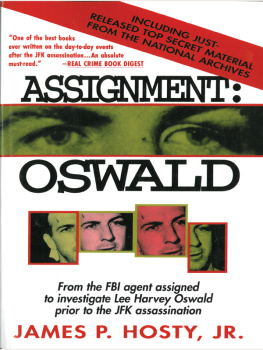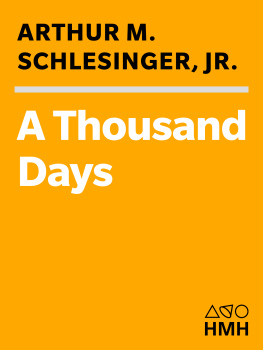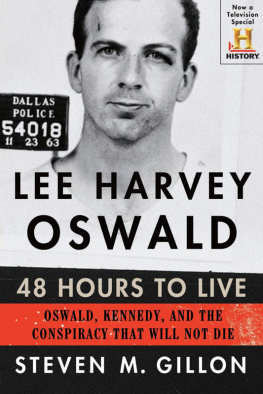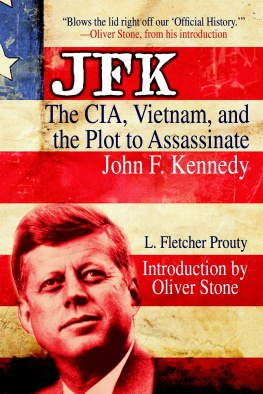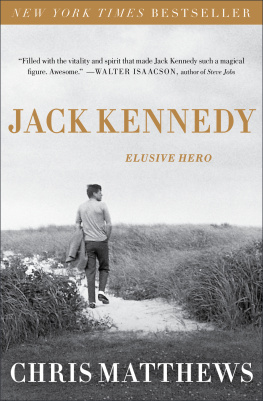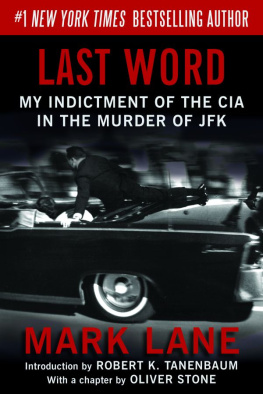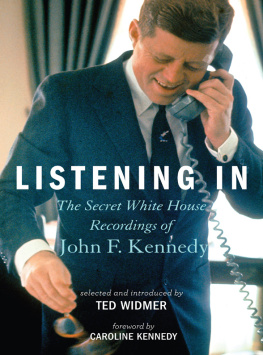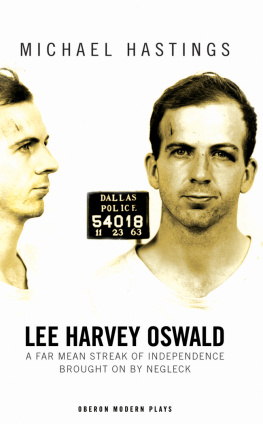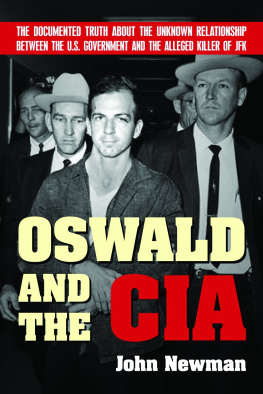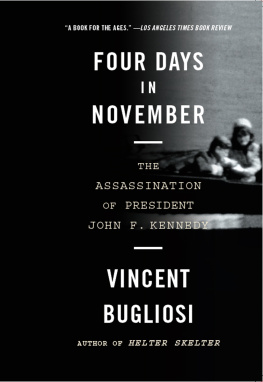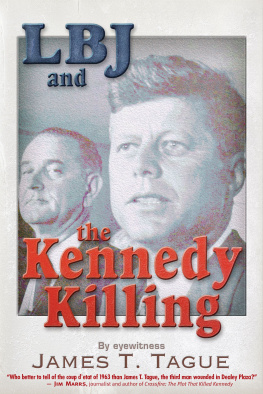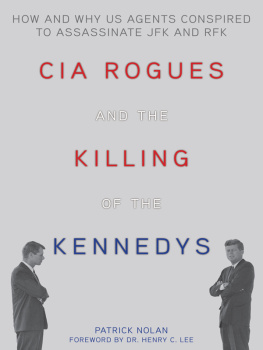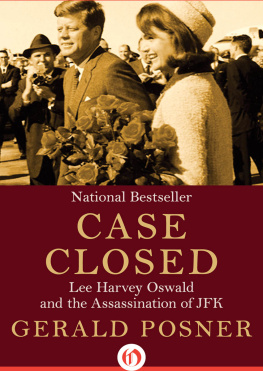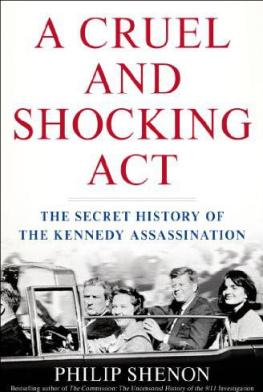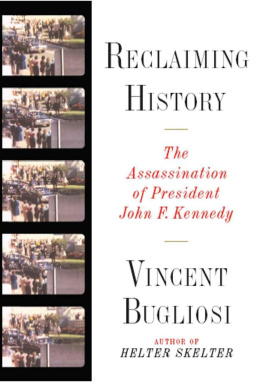ASSIGNMENT:
OSWALD
JAMES P. HOSTY, JR.
WITH THOMAS HOSTY

A R C A D E P U B L I S H I N G N E W Y O R K
Copyright 1996, 2011 by James P. Hosty, Jr.
All Rights Reserved. No part of this book may be reproduced in any manner without
the express written consent of the publisher, except in the case of brief excerpts in
critical reviews or articles. All inquiries should be addressed to Arcade Publishing,
307 West 36th Street, 11th Floor, New York, NY 10018.
Arcade Publishing books may be purchased in bulk at special discounts for
sales promotion, corporate gifts, fund-raising, or educational purposes. Special
editions can also be created to specifications. For details, contact the Special Sales
Department, Arcade Publishing, 307 West 36th Street, 11th Floor, New York, NY
10018 or arcade@skyhorsepublishing.com.
Arcade Publishing is a registered trademark of Skyhorse Publishing, Inc., a Delaware corporation.
Visit our website at www.arcadepub.com.
10 9 8 7 6 5 4 3 2 1
Designed by API
Library of Congress Cataloging-in-Publication Data is available on file.
ISBN: 978-1-61145-308-9
Printed in the United States of America
ASSIGNMENT: OSWALD
To my wife, Janet,
without whom I could never have made it.
And to my children, grandchildren, and their children.
This book is for them.
CONTENTS
Acknowledgments
Through the years many people have offered me their support and encouraged me to write this book. I wish I could thank them all, but at the risk of omitting some I would like to thank the following:
First, Bill Reese, a good friend who helped me focus on the events surrounding the assassination and put it all down on paper. Bill and I drank quite a few cups of coffee together a few years back, sorting through the vast amounts of information and organizing it into written form.
When my wife, Janet, and I began researching and compiling material and photographs for the book, we inevitably had to turn to the National Archives. We were very impressed by the Archives staff, especially Steve Tilley and Roland Bordley, whose help was precious.
My literary agent, Charles Schollenberger, one of my most enthusiastic supporters, provided valuable assistance in the early stages of the project. My publisher and editor, Dick Seaver, helped clarify and shape the massive material into a meaningful whole.
In September 1993, my son Tom, a lawyer, began to work with me on my original draft manuscript. Over the next year and a half we structured the work, checked and rechecked facts against my memory, trying to recreate, accurately and honesdy, the dramatic and tragic times in which I was so intimately, and painfully, involved. For most of this work I was home in Florida while Tom was in Kansas City, Kansas. It was a logistical challenge, but we got it done.
I also thank my other children for all of their support and encouragement over the years to write this book.
Finally, I wish to acknowledge my greatest supporter and confidante, my wife, Janet. I did not travel this journey alone. Janet was with me every step of the way. I know that I would never have survived the ordeal following the assassination without her.
James P. Hosty, Jr.
:
Monday, November 18, 1963
TIME: 8:15 A.M.
Okay, lets have some quiet and get started.
Gordon Shanklin, the Special Agent in Charge (SAC) of the Dallas-Fort Worth FBI office, had called an impromptu meeting of the forty or so agents present in the squad room. I closed a file I was reviewing at my desk and gave my attention to Shanklin.
As you probably all read over the weekend in the Dallas Morning News, President Kennedy and Vice President Johnson will be coming to Dallas this Friday, Shanklin said. Frankly, this is news to me, and I confess it ticks me off to learn it first in the press. I just called headquarters and was told the Morning News story was the first they knew of Kennedys visit to Dallas, too. It seems everyone was told except the FBI. I have to assume the FBI liaison with the White House isnt what it used to be.
At any rate, I called this meeting to remind you all of a few things. As you probably know, the Secret Service wants no help from the FBI in protecting the president or his party. Vince Drain here Shanklin nodded toward Drain, who was sitting across from me at another desk has already made contact with the Dallas Secret Service office, but was politely rebuffed. He was told in so many words they needed no help from us.
Because of all this, were going to do everything by the book, which means if any of you know of any threats of any kind to the president or vice president, refer them to the Secret Service. I want you all to err on the side of caution. If you have any doubt about whether to report a piece of information to the Secret Service, go ahead and report it. Lets be on the safe side.... Okay, thats it. Lets get back to work.
Like Shanklin, I had read the Morning News article on Saturday morning. Kennedy was making a swing through Texas this week to Houston, San Antonio, Fort Worth, Dallas, and Austin to shore up political support in this key state; the next presidential election was less than a year away. Despite getting trounced in Dallas in 1960 by a 2-to-l margin by Vice President Richard Nixon, Kennedy, with Johnsons help and influence, had been able to win Texas and its twenty-four electoral votes. But that was three years ago. Since then, Dallas had become more openly and vocally anti-Kennedy. Kennedy supporters like me were careful not to voice our pro-Kennedy opinions in this city, for fear of being verbally attacked and ridiculed.
In the 1920s, when the Ku Klux Klan played a dominant role in the city, Dallas had been known as the Hate Capital of the country. Back then the Klans national leader, the Imperial Wizard Hiram Wesley Evans, had come from Dallas. These days it was apparent to me that a large and obnoxious segment of the Dallas population was seemingly cut from the same cloth as its 1920s predecessors. Because of this strong radical right wing, Dallas was considered enemy territory for Kennedy.
My caseload in the four-man counter-intelligence squad in the Dallas office was dominated by right-wingers. I spent much of my time tracking the movements and actions of both Klan members and members of former U.S. Army General Edwin Walkers radical militia group, known as the Minutemen. Convinced there was a Communist hiding under every bush, the Minutemen had been quietly and discreetly arming themselves with an impressive arsenal of weapons. In the eyes of the Minutemen, Kennedy was at best a dupe of the Communists, at worst a Communist collaborator.
Among the agents this morning, everyone was discussing this right-wing element in Dallas and the fact that in all likelihood a threat to the president would come from that direction. We were all painfully aware of United Nations Ambassador Adlai Stevensons visit to Dallas just two weeks before, on October 31. During his visit, right-wingers had heckled and jeered him following his speech to a local group. One woman actually took her placard, which had a venomous anti-Stevenson epithet scrawled on it, and hit him over the head. We in the Dallas FBI were worried that Kennedy might be subjected to a similar display of hate from the right wing. He and his party knew they might be in for a less than friendly reception, and I understood that several of his key advisors had warned him not to come. As a Kennedy supporter, I had to admire the mans guts.
Tuesday, November 19, 1963

